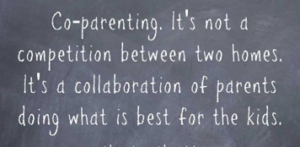04 Oct How are you doing with “Co-Parenting” the kids?? Part I

Great question. As a marriage and family therapist, when a couple decides to get divorced, due to whatever reason, and conflict and confusion ensues with regard to the children, some of the many questions I am asked range from “How do we work out this the co-parenting issue?”, “What are the Rules?”, “Is there a manual for this?” to name a few. There are many ways in which to answer these questions from “good luck”, “hope your ex is reasonable”, or “ask the children what they want”.
When these don’t work out too well and your well-meaning friends and family proposals have had disastrous results as well, I usually get the call from one of the exes because the children are acting out badly at home and at school. Then, when they come in to explain how the children are acting out and the chaos it causes in their lives (and it is usually all the children’s fault), I typically look at the parent and ask the simple question, “so what is going on with you and your ex?”
The usual response I receive is “what does this have to do with my ex?” In some cases, it might not have anything to do with your ex, however in most cases (where there is conflict and acting out), it does. Children will act out based on what is going on with a fighting couple, even after the divorce.
So, this caused me to think about and create a list of issues to consider when co-parenting, which I call “Co-parenting Issues for Divorced Couples” (original, right?). So here are some down and dirty bullets points to consider (based on the book called “In the Best Interest of the Child”, by Nadir Baksh, Psy.D and Laurie Murphy, Ph.D.):
Just like in school and in life where we learn about having a goal or something to strive for, there should also be goals for our co-parenting.
Given Premises / Goal:
Remember you both want what is best for your children, including: Overall health (mental, emotional and physical); Nourishment of their well-being; Enrichment of their lives; and to Protect them from harm.
Remember:
- You didn’t set out to cause them harm or damage, but it happened.
- How you handle the co-parenting going forward (after the divorce), will either help them through this situation or cause more damage and anguish.
- Trust the other parent is doing what is best for the child and that they are doing the best they can (have some Generosity – benefit of the doubt – remember the goal). This is not about trying to one up the other.
Things to consider about the children:
- Children cannot function without you – they are not self-sufficient mini-version of adults and they do not have the intellectual sophistication to act independently.
- They have no control over their lives.
- Children by definition are self-absorbed little people who do not appreciate their world being turn upside down.
- Children are not stupid and they are not big fans of change.
- Children need structure and boundaries; they need clear guidelines and good role models; need consistency, respect and love and need it from you both.
- Children need both parents – at the end of the day, they want both of you. They don’t want to have to choose one or the other. This has long term difficulties causing emotional and mental issues. The children do not want to be the referee.
- Through no fault of their own, their role in the family is one of dependency and helplessness. They do not call the shots, make decisions, right the wrongs or even control their bedtimes. They are at the mercy of their parents to restore some form of harmony or live in a world of chaos.
These are just some of the issues to consider about setting the goal or context by which to move forward with your ex in co-parenting. On a side note, if you at the beginning of getting a divorce, these are also things to consider about your children. They did not cause the divorce, but they will go there, depending on their age.
In the next post, I will mention some ideas about what to do and things to avoid in co-parenting traps.



